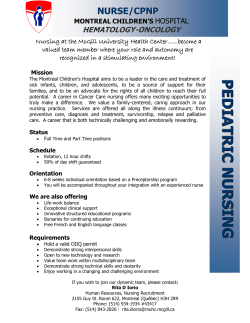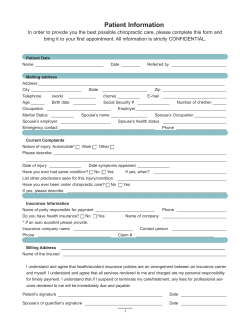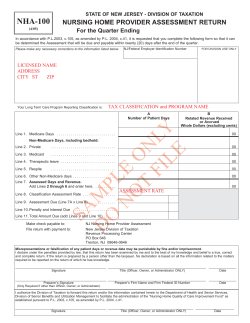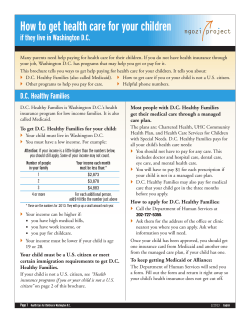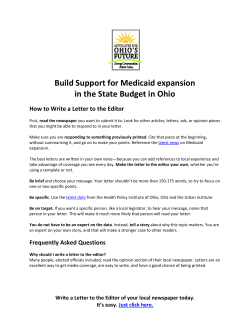
A Guide to the Institutional Care Program
A Guide to the Institutional Care Program Medical assistance for low income individuals in or entering a Nursing Home What is Institutional Care Program (ICP)? The Institutional Care Program (ICP) is a Medicaid program that helps people in nursing facilities pay for the cost of their care plus provides general medical coverage. ICP eligibility is determined by the Department of Children and Families (DCF). In a nursing facility, patients pay for services through private insurance or self-pay, or through Medicare, or Medicaid. The level of care is either skilled or intermediate. Medicaid can pay for intermediate & skilled care for an unlimited time period. Who may apply? The individual or their designated representative may apply. If there is a legal guardian, the guardian must apply unless the legal guardian fails to cooperate or cannot be located. Some eligibility requirements include: Be 65 or older or disabled as determined by Social Security criteria. Be a U.S. citizen or qualified noncitizen. Be a Florida resident. Have a Social Security number or apply for one. File for any other benefits for which you may be eligible (i.e., pensions, retirement, disability benefits, etc). Tell DCF about other third party medical coverage (i.e., health insurance). Be determined to be in need of nursing facility services. Be placed in a nursing home that participates in the Medicaid program. Have assets and income within the program limit. Asset limit $2000 for an individual and $3000 for a couple. If the individual or a couple has income at or below 88% of the Federal Poverty Level (FPL) the asset limit is $5000 for an individual and $6000 for a couple. Some types of assets that DO count: Real property, other than home. Bank accounts, Certificates of Deposit (CDs), money market funds. Stocks, bonds. Trusts. Life insurance cash value if the face value of the policies owned on any insured individual totals more than $2500 ($1500 for SSI recipients). CF/PI 165-131, 07/2011 Some types of assets that DO NOT count: Home, if the individual or dependent lives there, or if the individual is absent but intends to return. One vehicle. Revocable burial funds up to $2500 (or $1500 for SSI recipients). Irrevocable pre-paid burial contracts. Life insurance, if the total face value of all policies owned by the individual for any one insured does not exceed $2500 ($1500 for SSI recipients). Assets protected under a qualified long term care insurance partnership policy. (For more information visit: http://ahca.myflorida.com/Medicaid/ltc_partners hip_program/index.shtml.) Income limit: The income limit for ICP is three times the SSI limit and changes yearly. You can get the current income limit from DCF at: http://www.dcf.state.fl.us/ess/ssifactsheet.pdf. The total gross monthly income that belongs to the nursing home individual is considered in determining eligibility for ICP. Some types of income include, but are not limited to: Social Security Veterans Administration Benefits Pensions Income from mortgages Contributions Qualified Income Trust: Individuals with income over the ICP income limit may still be eligible if they set up a “qualified income trust” and deposit sufficient funds every month into the “qualified income trust” account so their income outside the trust is less than the income limit. To qualify, the “qualified income trust” must: Be irrevocable; Be comprised of income only; and, Designate that the state will receive any funds remaining in the trust upon the death of the recipient, up to the amount of Medicaid payments paid on behalf of the individual. Transfers of Income and Assets: Transfers of income or assets may affect eligibility. If income or assets are transferred for less than fair market value to become Medicaid eligible, a period of ineligibility may exist for the individual. This will vary depending on the value of the transferred income or asset(s). Anyone determined ineligible due solely to transferred income or assets cannot quality for nursing home payments. However, the individual may still qualify for basic Medicaid coverage (e.g., medicines, hospital coverage, etc). Allowable Transfers: Certain transfers are allowable. The individual may transfer: Any resource to a spouse or disabled adult child. The homestead, without penalty, to one of the following relatives: His/her spouse. His/her minor child (under 21 years) or his blind or disabled adult child. His/her sibling who has equity interest in the home and resided there at least one year prior to the individual’s institutionalization. His/her son or daughter who resided in the home for at least two years immediately before institutionalization and who provided care that delayed the individual’s institutionalization. Other transfers are evaluated case by case. Special ICP Policies that Apply to Spouses Assets and income are considered differently for married individuals when one spouse is in a nursing home and the other is in the community. At application, all assets (except for assets that do not count listed earlier) jointly owned between husband and wife must be counted together. An amount for the spouse not in the nursing home is subtracted from total assets. This is called the community spouse resource allowance (CSRA). After approval, joint assets within the CSRA must be owned solely by the community spouse by the first annual Medicaid review. Only income of the spouse in the nursing facility is used to determine eligibility. After approval, part of the institutional spouse’s income may be allocated to the community spouse to help with living expenses at home. How Much Does the Patient Pay? After the individual is determined eligible, a special budget is used to determine the monthly amount the patient is responsible to pay. In general, all of the patient’s monthly income, except for $35 for personal needs, must be paid to the nursing facility for the patient’s care. This includes any funds deposited into a “qualified income trust”. The payment to the facility is called the “patient responsibility”. All or part of the patient’s income may be set-aside for the spouse or dependents, reducing the amount the individual must pay to the nursing facility each month. Another deduction that may be subtracted from the patient responsibility is uncovered medical expenses such as health insurance premiums (other than Medicare) co-pays and deductibles. In some situations certain Veteran’s Administration (VA) payments will also be deducted in the budget. The eligibility worker calculates the patient responsibility amount. How Much Does Medicaid Pay? Medicaid pays the difference between how much the patient pays (patient responsibility) and what the nursing facility charges under Medicaid. Changes Changes need to be reported as soon as the change is known. These may include changes in income or assets insurance coverage, or leaving the facility. Reviews Annual reviews are required for continued eligibility. A notice will be mailed to the patient, designated representative, or legal guardian yearly. How to Apply: Individuals can apply for benefits: From any computer with internet access by visiting our web site: http://www.myflorida.com/accessflorida or, At one of the Department’s ACCESS Florida community partners. A listing of community partners can be found online at: http://www.dcf.state.fl.us/access/CPSLookup/se arch.aspx or, At a DCF ACCESS Florida Customer Service Center. A list of Customer Service Centers can be found online at: http://www.dcf.state.fl.us/ess/ or, By requesting a paper application by calling 1866-762-2237 and submitting it in person, by mail or fax. Individuals may check their case status through the My ACCESS Account icon listed on the ACCESS website at http://www.myflorida.com/accessflorida/. This is available 24 hours a day 7 days a week. After registering, you can: Check on the status of an application or review; See a list of items you need to return; See when the next review is due; See the date and time of a scheduled appointment; See the amount of the patient responsibility (if there is one); and, Print a temporary Medicaid card (once approved).
© Copyright 2025
